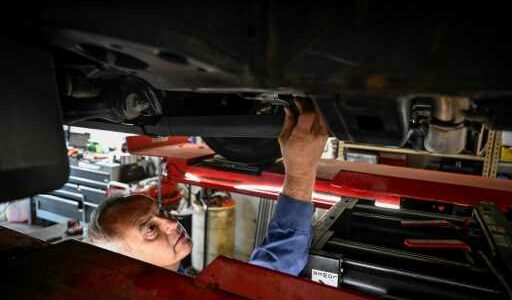
Denver law enforcement officials view state law changes focused on catalytic converter thefts as insufficient
Denver is poised to take steps toward combatting catalytic converter thefts after seeing a nearly 900% increase last year in instances of the auto part disappearing from under vehicles.
Matthew Lunn, the Denver Police Department’s director of strategic initiatives, went before the city council’s safety committee Wednesday to outline proposed code changes law enforcement officials hope will put a crimp on thieves snatching the valuable emission control devices. Passed by the committee, the measure is headed to the entire city council for approval.
The bill would require auto parts dealers and resellers purchasing second-hand converters to require a valid photo ID from the seller. They would also be required to take a photograph or otherwise copy down information from that ID.
The most impactful part of the legislation, Lunn said, is it would require dealers who buy converters to report the purchase to law enforcement within one business day. The bill mirrors laws governing pawn brokers.
The state legislature passed a handful of bills aimed at curbing catalytic converter theft in its 2022 session but Denver officials see flaws in the new rules, mainly due to the fact that catalytic converters do not have serial numbers that would make them easy to cross-check against a national registry or database.
“We think that Denver can lead in this space and collaborate with our local businesses to address these issues,” Lunn said.
In Denver, 2,679 catalytic converters were stolen in 2021, an 899.6% increase over 2020. So far in 2022, the city is on pace to break its 2021 record with 34 more converters stolen as of July 5 than at the same point last year, Lunn said.
It’s a statewide problem. As the value of precious metals has skyrocketed, so have thefts of the small car components that contain rhodium, palladium, and platinum. In Colorado, just 189 converters were reported stolen in 2019. That number hit 9,811 in 2021, a more than 5,000% increase.
A capable thief can steal a converter in less than 30 seconds, Lunn said. There have also been reports of armed lookouts in converter theft cases. Organized crime rings are believed to be involved in the rash of thefts.
The leading places in the city for converter thefts are apartment complex parking lots, Regional Transportation District park-n-ride lots and Denver International Airport, according to Lunn’s presentation.
Councilwoman Robin Kniech said the catalytic converter was stolen from her wife’s car at an RTD lot and that “it is disruptive, it is expensive and, frankly, you have a long wait to get the replacement part right now.”
Councilman Kevin Flynn supported the bill but worries that thieves in his southwest Denver district will simply go to other neighboring cities to sell their stolen items, circumventing any city law. He also asked if the city could go further and make it illegal for recycling businesses and auto-part dealers from accepting second-hand converters at all.
“It occurs to me that if someone shows up to the recycling shop with a catalytic converter, it’s probably stolen. I can’t think of any constituent who has sawed off their own and taken it in,” Flynn said.
The legislation is viewed as a first step in addressing the theft problem and will work in conjunction with state laws focused on converters, assistant city attorney Reggie Nubine said. He noted there are “chop shops” in Denver where people can take parts of cars for valid reasons.
Being able to track who is selling used converters will allow law enforcement to identify trends and zero in on people already under investigation, Lunn said.
Source: Read Full Article